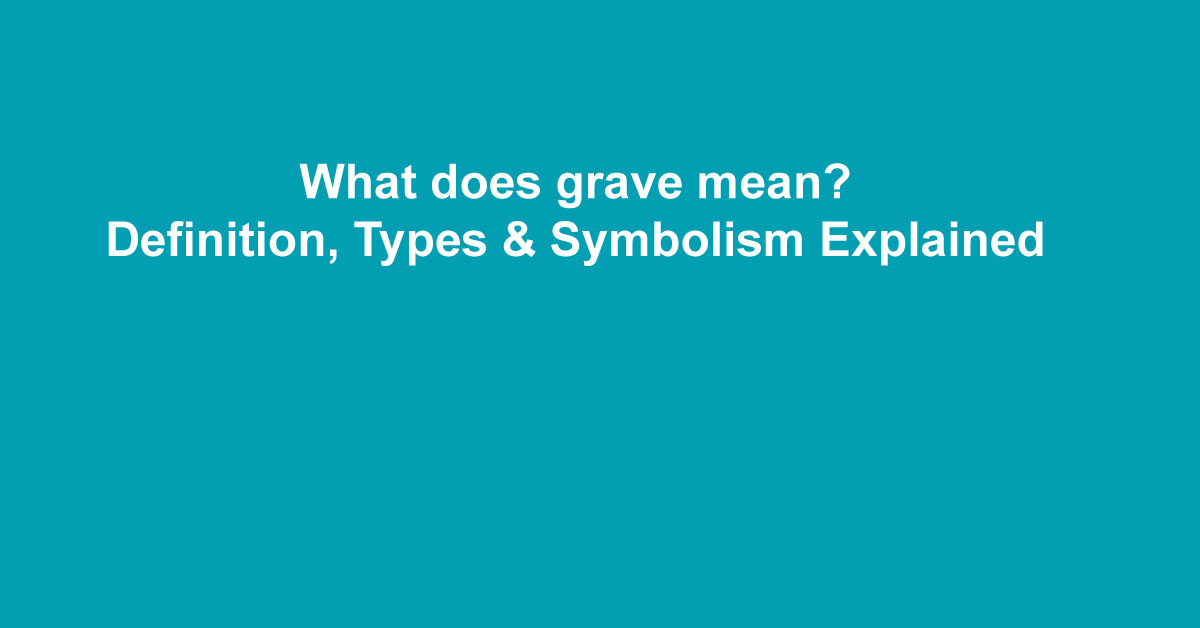What Does Grave Mean?
What does grave mean? Definition, Types & Symbolism Explained, A grave is more than just a physical space where someone is buried it’s a cultural, emotional, and historical marker that represents remembrance, respect, and legacy. In this article, we’ll explore the definition of a grave, its types, its significance in different cultures, and commonly used grave-related terms.
What is a Grave? (Simple Definition)
A grave is a specific place, usually in the ground, where the body of a deceased person is buried. It often includes a headstone or marker that displays the person’s name, birth and death dates, and sometimes a message or epitaph.
Origin and Meaning of the Word “Grave”
The word “grave” comes from the Old English “græf”, which means “a ditch or trench”.
In modern English, it refers both to a burial site and metaphorically to something serious or solemn (e.g., a grave situation).
Types of Graves
There are several types of graves, depending on cultural practices, geography, and religion:
1. Standard In-Ground Burial
Most common form
Includes a coffin or casket, buried several feet underground
2. Family Plot
A group of graves belonging to members of a single family
Often located together in a cemetery
3. Unmarked Grave
A grave with no headstone or visible marker
Used in historical, military, or poverty-related burials
4. Mass Grave
A burial site with multiple people, often linked to war or epidemics
What Is Usually Placed on a Grave?
Headstone (tombstone): Displays name, birth/death dates, epitaph
Flowers: A sign of respect and remembrance
Grave markers: Crosses, stones, or cultural symbols
Symbolism of the Grave
Represents end of life, memory, and respect for the dead
In many cultures, visiting a grave is a way to maintain a connection with ancestors
In literature and media, a grave can symbolize finality, loss, or peace
Cultural Views on Graves
| Culture / Religion | Burial Tradition |
|---|---|
| Christianity | In-ground with headstone |
| Islam | Body laid on right side, facing Mecca |
| Hinduism | Cremation is more common, but graves may exist |
| Judaism | Simple graves with a focus on humility |
| Ancient Egypt | Elaborate tombs like pyramids |
FAQs – What Does Grave Mean?
Q: What is the literal meaning of grave?
A: A place where a dead person is buried in the ground.
Q: What is the difference between grave and tomb?
A: A grave is usually underground; a tomb is often an above-ground structure like a crypt or mausoleum.
Q: Is “grave” used in other ways?
A: Yes, “grave” can also mean serious or solemn, like in the phrase “grave danger”.
Q: What is the origin of the word “grave”?
A: It comes from Old English “græf”, meaning a ditch or trench.
Final Thoughts
Understanding the meaning of a grave helps us appreciate not just the physical resting place, but also the emotional and cultural weight it carries. Whether you’re researching for genealogy, history, or personal reasons knowing what a grave means is the first step in honoring those who came before us.






